
Top 15 Largest Animals of all Time...
Wildlife
The Editorial team
849 views
0 likes
You will need to sign in before you can comment or like.
Top 15 Largest Animals of all Time...
Wildlife
The Editorial team
Prepare yourself to get a dose of
nature at its best. We will present
animals unheard of which you find
unbelievable.
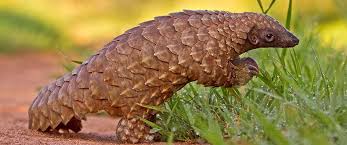 Pangolin
Pangolin
Superpower: Bulletproof body and ability to curl into a ball
Pangolins or ‘scaly anteaters’ are
covered in tough, sharp scales
composed of keratin. Their name
comes from the Malay word
‘Peggulin’ which means
“something that can roll up”.
They are nocturnal, and rampage
anthills consuming ants and
termites with their long tongues.
On being attacked, they cover
their head with front legs,
exposing the scales.
Even predators like
lions can’t figure out
what to do with the
‘pineapple’ since the
bite cannot tear the
hard scales. (But some
still try it out).
Chiton
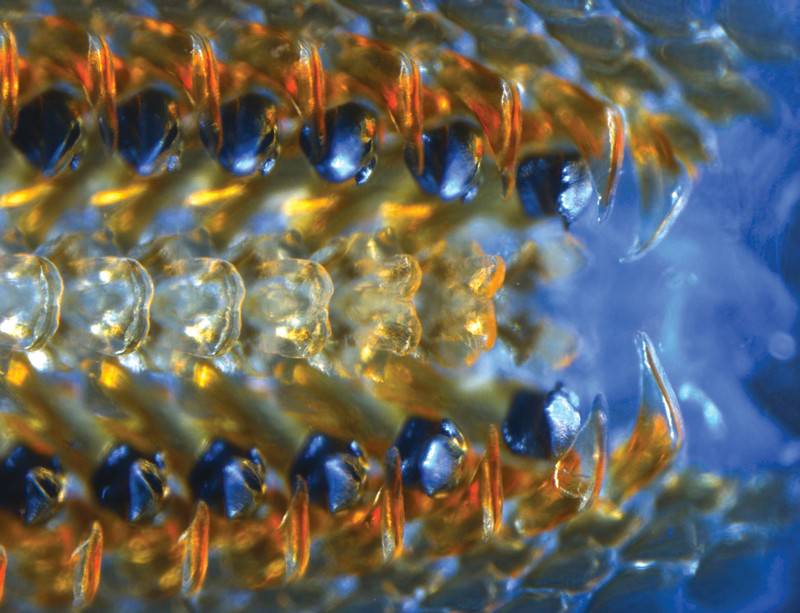 Superpower: Possesses
teeth of magnetite, the
hardest of any other animal.
Superpower: Possesses
teeth of magnetite, the
hardest of any other animal.
Swimming in the seas for nearly
400 million years, these marine
molluscs have an interesting
speciality in the most unusual
part of their body i.e. their teeth. Yes, these teeth have magnetic properties?, since they are
made from magnetite, the primary material out of which magnets
are manufactured. Chitons,
have shells with eight
segments, a muscular foot and
of course magnetic teeth,
sharp enough to scrape even
bacteria along with algae on
rocks.
Some scientists are getting mad (researching) on this and state
that synthesizing such an iron oxide substance would require high
temperature and pressure along with strong acidic or basic
conditions. Fact is that these creatures are able to produce that
only with the algae they eat and that only in ocean water
surroundings
 Mantis Shrimp
Mantis Shrimp
Superpower:Can see all
sorts of light, including Ultra
Violet and Infra-Red
That incomprehensible body,
bulbous elbows, segmented body,
and those huge bulging eyes.
The Mantis Shrimp is widely
famous for its punches, but we
are not taking up on that topic.
Well, most of us (exception =
Warren) don’t know the
superpower secret behind those
monstrous eyes – They can see
more than any other, having the
broadest visual spectrum of any animal discovered. Scientists are
studying the Peacock mantis Shrimp in
an (till now unsuccessful)
attempt to build cameras
capable of seeing cancer cells at its very
early stages.
Imagine having an extra pair of arms
capable of moving freely in all directions
with eyes on the ends!
Lyrebird

Superpower:Ability to
mimic any sound present in
its habitat jungle.
Have you recently boasted about
your favourite singer? Most
likely to be yes. But now what you
are going to read will completely
change your mind.
Lyrebirds, who get their
name from the elaborate and
unwieldy tail, shaped like a lyre.
However its superpower i.e. its
vocal abilities is what we will now
discuss.
These birds actually
mimic sounds of other
birds during the
breeding season to
impress other
females and probably
fool some of other
species. They even learn to imitate the different sounds of the
forests they live in, wing beats, rustling of leaves, blowing of wind
etc., if kept in captivity, hammers, drills, chainsaws, car silencers
and horns, and many more.
They learn the mimicry mainly from older males, rather than the
model species. But friends, don’t think that our superbird can only
copy, they even have their own songs and calls (perhaps to use as
backup if the normal impression method does not work).
Hairy Frog
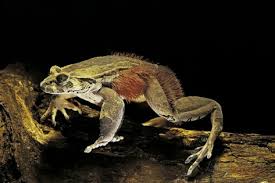
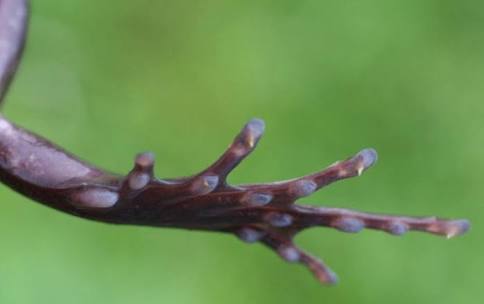 Superpower: Pierce its bones through the skin to use it as a
claw against predators
Superpower: Pierce its bones through the skin to use it as a
claw against predators
Remember your favourite hero Wolverine from Marvel Avengers
who has retractable alloy claws? Well, here we have a real living
version of that. And you wouldn’t believe the ‘claw’ is actually its
broken finger bone? It’s the Hairy frog about which we are talking.
The hair you see are not hair but are modified gills. On being
provoked, our hairy amphibian friend forces the bone nodule
through the skin, using it as a defensive claw.
Researchers couldn’t
figure out how it
retracts the claw
back that only
without the pulling
of a muscle.
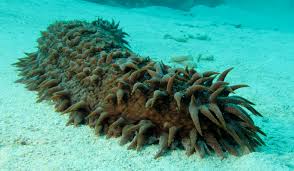 Sea Cucumber
Sea Cucumber
Superpowers:
- Ability to liquefy and solidify its body per will.
- Forces its organs through the anus during predator attacks.
- Breathes through anus
- Can reproduce through asexual reproduction
Don’t consider this to be a tasty
delicacy as is done in parts of
Asia, just because the name
stupid scientists gave it.
These strange creatures live on
the seafloor, functioning as a
scavenging machine.
So let’s now explore its
capabilities, one by one.
Sea cucumbers have an
endoskeleton in the form of
plates beneath their skin, joined
by connective tissue. The collagen bonds can be loosened and
tightened per will, which means it can liquefy its body to fit through small cracks and crevices, and
solidify it when a predator attacks.
In case of sudden predator attacks,
our super echinoderm forces its
internal organs out through the
anus, along with a toxic substance.
The missing organs grow back in the
next 1.5 to 5 weeks.
Sea cucumbers breathe (take oxygen) through the network of
channels in the anus.
Possess alternative self or asexual reproduction, normal
fertilisation occurs by fusion of cells released in the water.
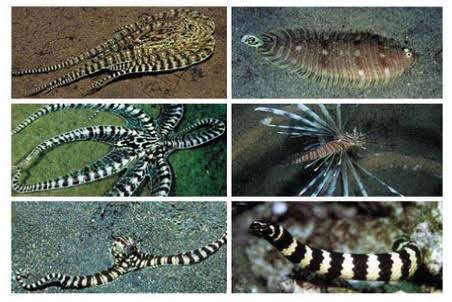 Mimic Octopus
Mimic Octopus
Superpower:Mimic characteristics of 25 different other species
Till now you may have wished of transforming into an animal of your
choice, probably it may be from this article only. Consider
transforming into a tiger if cornered by a group of school bullies!
Well, our next contestant does exactly the same.
The mimic octopus, as its name suggests, mimics forms of over 15
different species. This behaviour is observed when it hunts prey or when cornered by predators. For example, if attacked by a
damselfish, it becomes a sea snake, the attacker’s predator.
Here are some of the mimic octopus’s forms along with a description
of how it transforms.
Sea Snake – It hides in a hole leaving two of its arms in the open, it
opposite directions. The added length of the arms appears like a
long thin object, which is mostly avoided.
Lionfish – By shaping its arms like spines of this highly venomous
predator, it easily fools many a lot.
Flatfish- By pulling all its arms to one side and changing its colour,
it quietly slips out of its astounded predator.
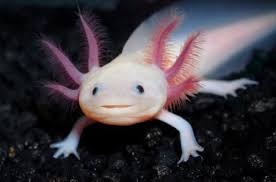 Axolotl
Axolotl
Superpower:Ability to
regenerate any amputated
part of body.
Wearing a feathered headdress,
little black lidless eyes, wide
head and pink complexion. You
must wondering what creature
we are now talking about. Well
you wouldn’t had recognised it by
its name either (Neither did we)
Even more fascinating is its
regeneration abilities by which
it can grow back any amputated
or cut part. And yet more
amazing is that these creatures
can receive transplanted organs from other individuals.
Axolotls also possess a fascinating neoteny in which an individual
retains its juvenile characteristics on maturing.
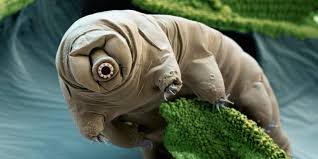 Tardigrade
Tardigrade
Superpower:Ability to
survive in most extreme
conditions of earth (and
space)
Greatly resembling creatures
from a Horror movie, what you
are now going to read is
something literally “out of this
world”. Tardigrades or ‘Water
Bears’ get their name from
‘Tardigrada ‘ meaning “slow
stepper”. From the Himalayas to
the ocean floor, from hot springs
to Antarctica and even in your
drain, these tough guys can
survive much extreme conditions than that of earth, even the
radiation and lack of air of outer space. Tardigrades can also survive
temperatures above 150°C and as low as -200°C for 21 months and
-272°C for 8 hours compared to the lowest temperature recorded
on earth was -89°C. Water, an essential component of life, is a thing
these creatures can do without for decades. In 1948, a scientist
reanimated a tardigrade from a 120 year old museum sample after
rehydration. The reason for this is the presence of a particular
sugar, which stabilises the components such as proteins and DNA.
After staying in this state called the tun state, tardigrades repair
their DNA (damaged by staying in the tun stage for a long time) by
antioxidants. Tardigrades produce ice nucleatic agents which
doesn’t allow the ice crystal to form inside the, instead it forms
outside. The deepest point of the Mariana Trench has a pressure up
to 100 MPa, tardigrades can resist 6 times more than that.
The Immortal Jellyfish
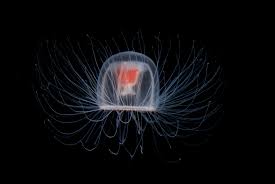
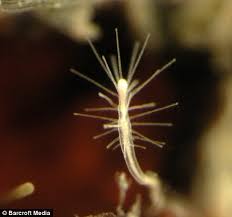
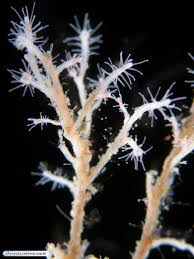
Superpower:Ability to transform back to infant stage on
maturing and declared biologically immortal.
Unbelievable as it is, these minor
animals use the process of
transdifferentiation to transform back
to the infant stage when they succumb
to injuries or become old.
These jellyfish begin their life as
planula, the larva stage. As it settles
down, it forms a colony of polyps. The
jellyfish buds off from the cluster and
forms an individual, the medusa stage, which we know as a jellyfish. Now
comes the trick, since now when it gets old or injured, and it transforms back to the polyp stage.
Comments